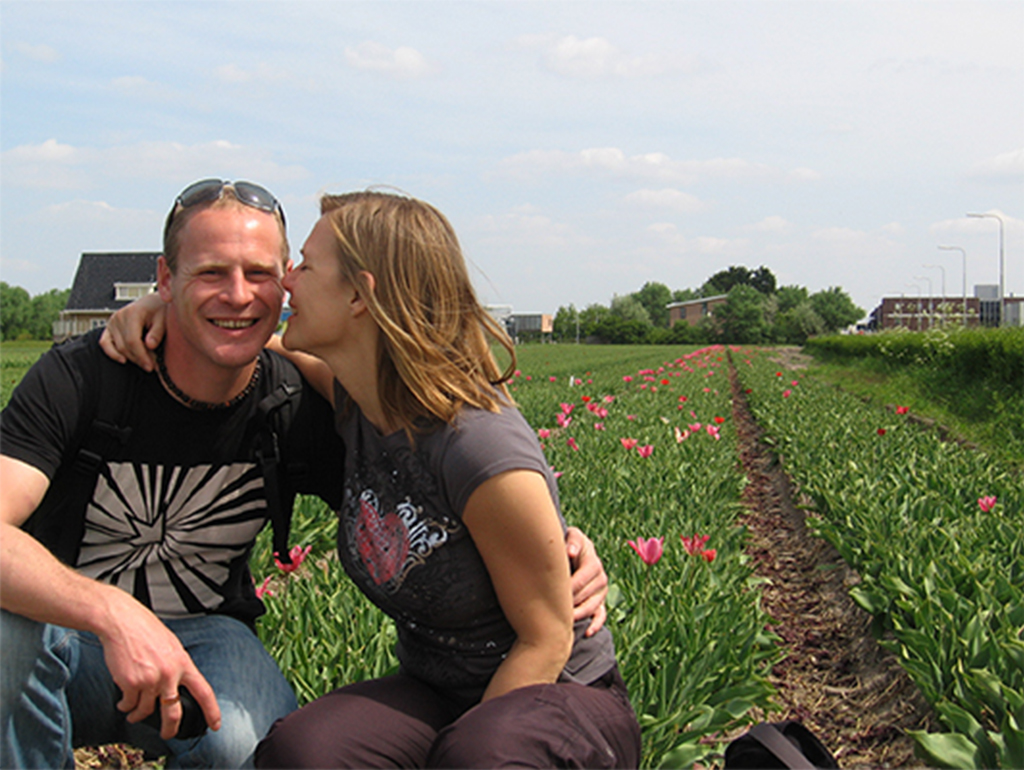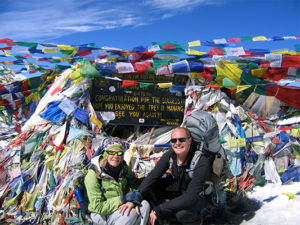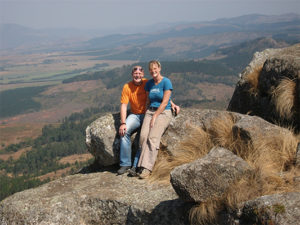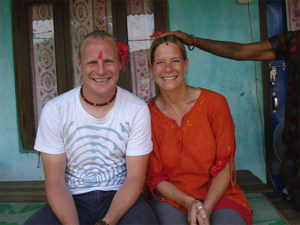
Karen and I met in a sea of orange. It was Koninginnedag and we were in Amsterdam. On this day, once a year, hundreds of thousands of people dress in the nation’s colour, filling the bars, streets, plazas and canal banks in a state of frenzied madness. We kissed in the orange haze and everyone and everything around us fell away. I knew that we were surrounded by thousands of shouting revellers, but at the same time it was just us, connected, as if we were the only two souls left in the world.
 In that moment, I knew that that Karen and I had something incredible and soulful. We’re lucky. You can walk your whole life looking for this and we just stumbled upon it. I knew that immediately. That’s why it felt completely normal when we moved in together after four days and married after six weeks and then went to Nepal to climb the Himalayas. After that, our humanitarian work took us to war-torn Iraq and South Sudan as well as Swaziland and Kenya.
In that moment, I knew that that Karen and I had something incredible and soulful. We’re lucky. You can walk your whole life looking for this and we just stumbled upon it. I knew that immediately. That’s why it felt completely normal when we moved in together after four days and married after six weeks and then went to Nepal to climb the Himalayas. After that, our humanitarian work took us to war-torn Iraq and South Sudan as well as Swaziland and Kenya.
We raced around the world, knowing that home was where we were at that moment, just because we were both there. Now, we’ve learnt that life can’t be turbo-charged all of the time and that’s OK. Life should be about change. We’ll both change a thousand ways over the years ahead and that will be fine, because we always, always talk to each other.
That’s why I wasn’t surprised when Karen said she was doing ‘the Process’. We’re always looking to understand ourselves more and the Process was just a continuation of this. To me, the idea of Karen going on some sort of retreat for a week while our son, Ruben, and I enjoyed some father-son time wasn’t foreign at all, but still, in the back of mind I did have a nagging voice. What was this Process all about?
 For a start, it is an odd name. A process is something you follow to get a mortgage, or something they do to cheese. Sometimes work can feel like going through a bit of a process, but can you really process people? That felt odd.
For a start, it is an odd name. A process is something you follow to get a mortgage, or something they do to cheese. Sometimes work can feel like going through a bit of a process, but can you really process people? That felt odd.
We talked about it, but even Karen couldn’t really explain it. It wasn’t psychotherapy, or counselling, or life coaching, or mindfulness, or anything else I suggested. I couldn’t put a label on it. The intrigue continued when Karen had to do hours of pre-course work. Sitting in the garden, I could see her pondering things, searching memories, looking for reasons. Eventually, I just let go of trying to pigeonhole it and decided I’d just have to trust it all.
Before Karen left for the week, she gave me an information sheet that Hoffman have written to provide partners and others with useful guidance. That was really helpful because it filled in some blanks and reinforced that some of the intrigue and apprehension I was feeling was completely normal.
When one of us goes away, we have a habit of agreeing the situations in which we should contact each other, for example if something goes drastically wrong. It might seem clinical to others, but it is something you get used to when you’re flying in and out of war zones, with limited means to communicate. So it felt comforting to know that there was a number I could call to contact Karen if something major happened. When she left, I watched her drive down the road, somewhat into the unknown, hoping that she would find whatever it was she needed to find.
 Seven days later, a new Karen arrived at our doorstep. She had a huge smile on her face and was truly, truly happy. She was literally bouncing with freedom and oddly, seemed much, much younger again. She had a palpable sense of liberty.
Seven days later, a new Karen arrived at our doorstep. She had a huge smile on her face and was truly, truly happy. She was literally bouncing with freedom and oddly, seemed much, much younger again. She had a palpable sense of liberty.
Sometimes in life, there are moments where all things align, when everything is conceivable and when your options are boundless. I call these ‘moments of infinite possibilities’. When you see this in others it’s inspiring, and when you see it in the ones you love, its truly beautiful and profoundly infectious.
Ruben has a more relaxed and playful mum and together we all have a new sense of stability. We’ll always travel and explore, but now we don’t need to find that elusive and undefinable something, because it is here, with us, right now. We can feel it.
If it takes just seven days for your partner to discover and to ‘move-on from’ the thing that has haunted them for years, then it doesn’t matter what it’s called or what it is. All that matters, is that you support them to do it, allow them the space to explore and be a part of the new and beautiful world when they return.
Here are my top tips for supporting someone going on the Process:
-
- It probably won’t be exactly clear what the Process is all about before your loved one departs, so be open and be trusting.
- Agree the circumstances in which you can contact your loved one, before they leave.
- When your loved one returns, allow them space. They’ve been through an incredible journey and they’ll share it with you when they are ready.
- Understand that you will hugely benefit from the Process as well. If your loved one finds moments of infinite possibilities, that is good for you too.
Dan is featured in the 2018 issue of Hoffman magazine. To order a FREE copy for yourself, friends or family, click here.






 Sign up to receive monthly newsletters from Hoffman
Sign up to receive monthly newsletters from Hoffman